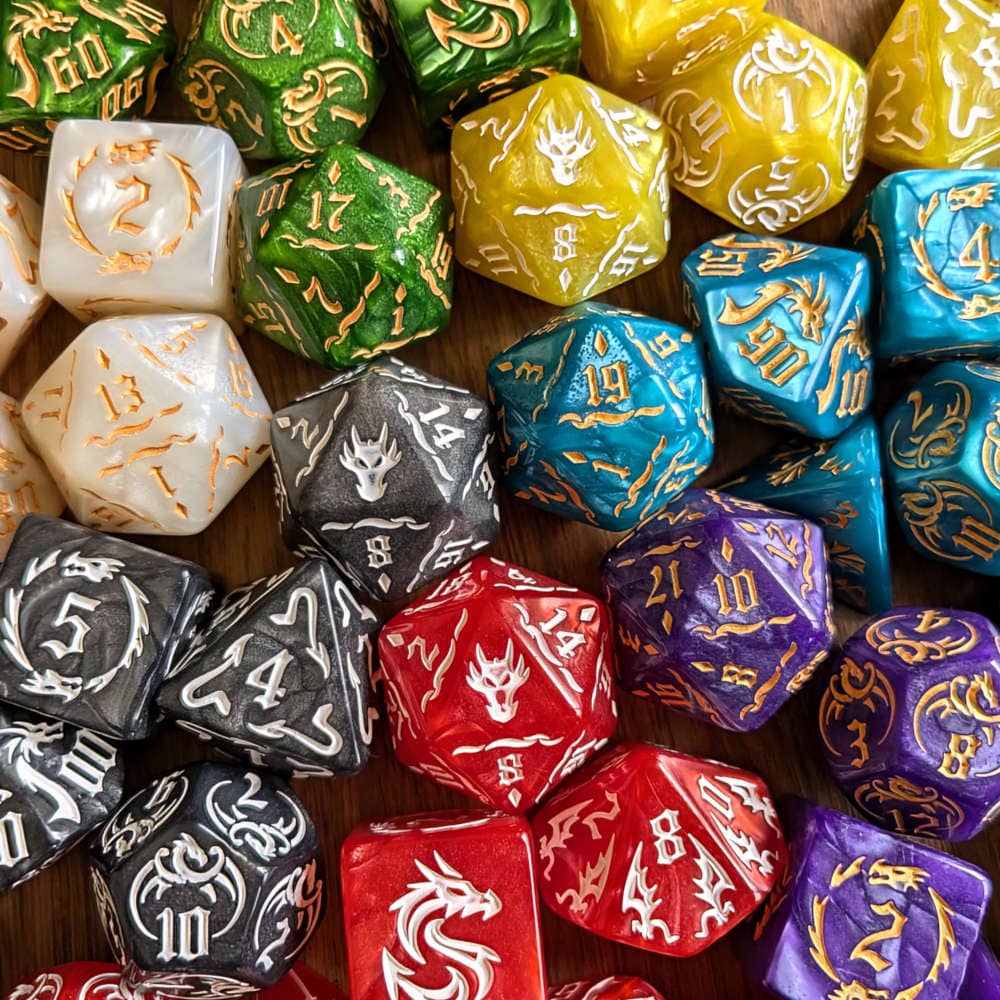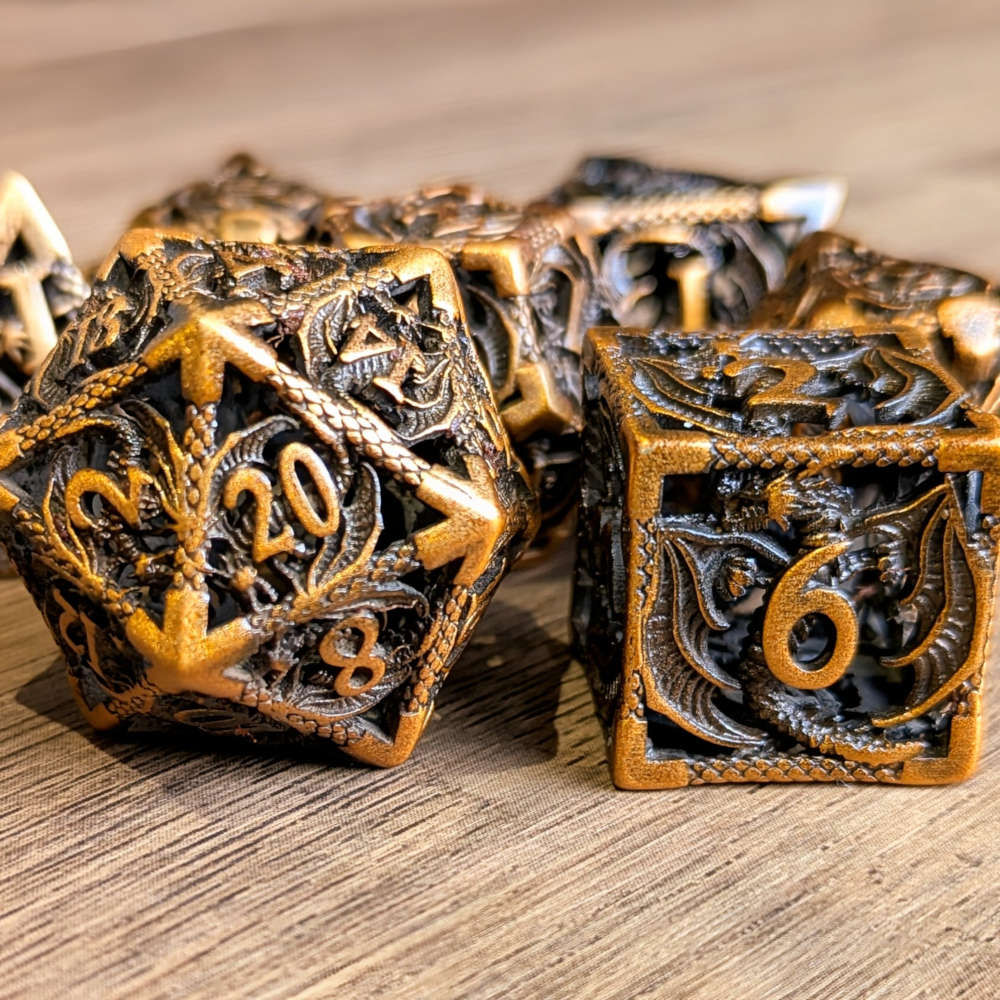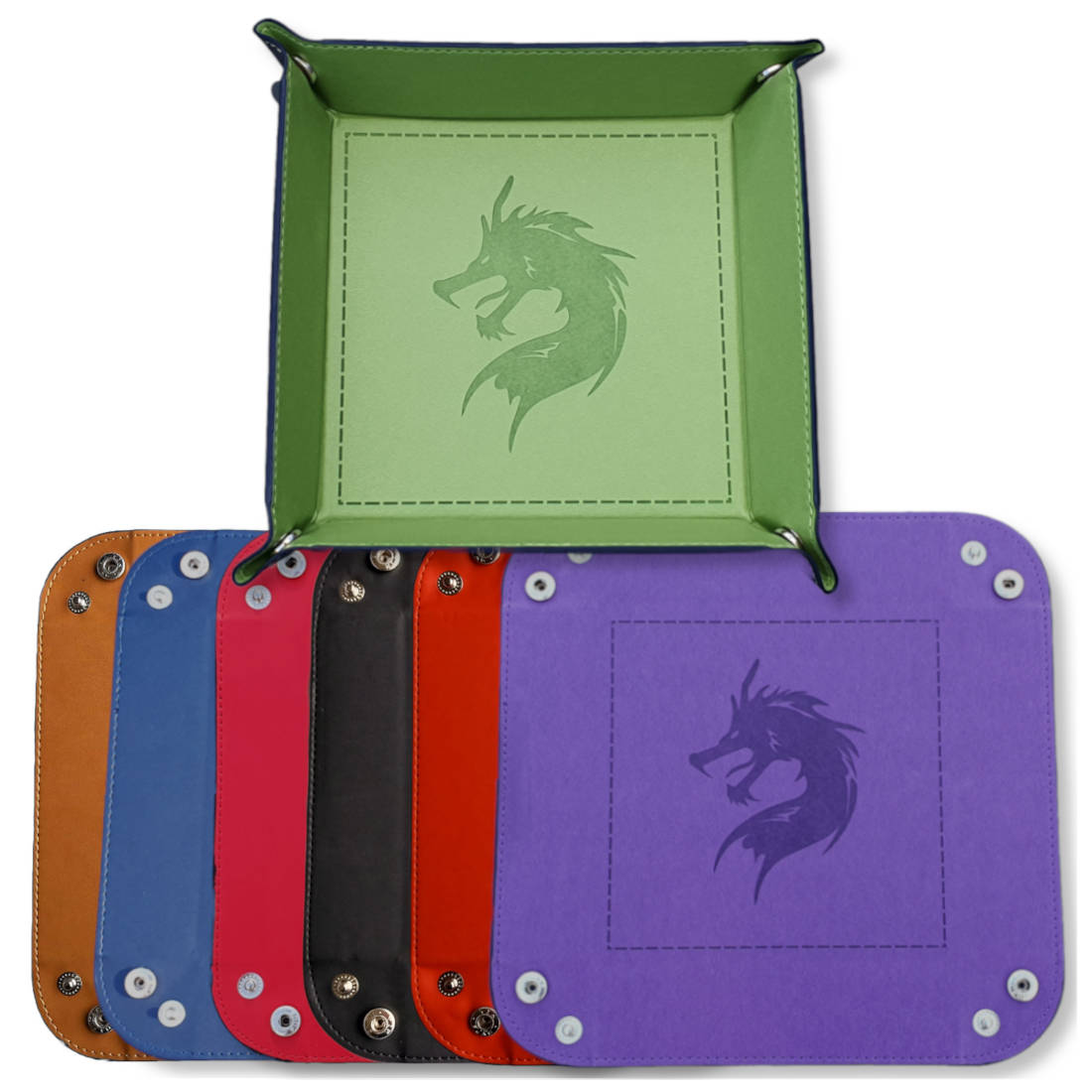How to roleplay better in DND

Roleplaying is at the heart of Dungeons & Dragons (DND), turning every campaign into a rich, immersive storytelling experience. Whether you're new to the game or an experienced player, knowing how to roleplay better will elevate your adventures and bring your character to life.
In this guide, we’ll share essential roleplaying tips for DND to help you stay in-character, build deeper connections, and create unforgettable moments at the table.
What is roleplaying?
In DND, roleplaying is the art of embodying and acting as a character within a story. It involves making decisions, interacting with other characters, and navigating the game world through your character’s personality, goals, and backstory.
The essence of roleplaying is about engaging with the narrative in a way that feels authentic to your character, helping create a rich, collaborative story that’s shaped by everyone at the table.
It's important to note that roleplaying isn’t just about putting on a funny voice or making decisions that only serve to frustrate the group. While some players enjoy embodying their character's mannerisms or accents, roleplaying goes deeper - it’s about making choices that are true to your character's beliefs and motivations, and respecting the group's shared experience.
Do you have to roleplay in DnD?
No, you don’t have to roleplay in D&D. The beauty of Dungeons & Dragons is that it’s an incredibly flexible game, allowing you, your Dungeon Master, and your fellow players to tailor the experience to your preferences. Whether you prefer a more combat-focused or story-driven game, you can adjust the level of roleplaying to suit your group.
That said, while roleplaying isn’t mandatory, it’s a fantastic way to immerse yourself in the world, create memorable characters, and build unforgettable moments with your friends. The extra layer of depth it brings to the game often makes the adventure even more enjoyable!
How to get better at DnD roleplay
To get better at roleplay, start by making a unique D&D character. Think about their morals, motivations, and backstory. Consider any quirks, flaws, or mannerisms they might have – this isn’t mandatory, but it can help make them more distinct and provide you with something to work with when you're in-character.
During sessions, try to think in your character’s shoes: How would they react to recent events? What would they feel? How would they act? Let these considerations shape what your character says, does, or doesn’t do.
Here are some more tips for getting better at roleplay in DND:
Write a backstory
Crafting a backstory with unique experiences, influential people, and significant events helps define your character’s behaviour and motivations. You can also include NPCs tied to your character’s past, providing the DM with potential story hooks and deeper narrative possibilities.
Define traits and flaws
Just like real people, characters have strengths and weaknesses. Identifying these can add richness to your roleplay. It can lead to decisions that may not always be the best, but are fitting for the character’s unique perspective, making their journey more complex and authentic.
Focus on action
Roleplaying isn’t just about funny voices or dramatic gestures (unless you want it to be!). Start by narrating your character's actions, thoughts, and feelings. When you’re comfortable, you can gradually introduce more in-character dialogue and acting, but the key is to feel immersed in the character’s choices and actions.
Use "Yes, and" and "No, but"
Embrace improvisation in DND with a "yes, and" mindset - this keeps the story flowing and adds layers to the narrative. If your character disagrees with something, use a "no, but" approach: rather than simply saying "no," offer a reason for the disagreement in-character.
For example: "My character feels this plan won't work because..." This approach not only keeps the flow but also deepens the roleplay.
Engage with other characters
Show interest in other characters by interacting with them, even outside of combat. Small talk, like asking another character how they’re feeling or what drives them, can create opportunities for deeper connections and meaningful roleplay moments.
A simple “So, what is it that keeps you going?” can lead to powerful and unexpected conversations.
Prepare for sessions
Consider your character’s goals, desires, or unresolved questions before each session. Preparation doesn't have to be extensive, but it can give you more to work with, especially if you're feeling anxious about playing DND.
It’s also helpful for DMs to have a few NPCs or potential scenarios ready in case the players decide to go off the rails. For more tips, check out our DND session preparation checklist.
Experiment and learn
Don’t be afraid to try different approaches to roleplaying, whether it's speaking in first-person or third-person, or experimenting with different voices or emotional tones. You’ll discover what feels natural for your character over time. It’s all about finding what works best for you and your roleplay style!
Embrace mistakes
Don’t worry about making mistakes or looking silly. Roleplaying is all about taking risks, and embracing imperfections often leads to unexpected and memorable moments.
Whether it's experimenting with an accent that doesn't quite hit the mark or trying a new emotional depth, mistakes are part of the fun and growth in roleplaying. Everyone makes them, and they’ll only enhance your experience.
How do you stay in-character when roleplaying?
Staying in-character during roleplaying can be one of the most rewarding parts of D&D, helping you become more immersed in the story. Here are some tips for roleplaying to help you stay in character:
- Visual aids: Create a connection with your character by finding an image online, using tools like Hero Forge, or commissioning artwork. Having a visual representation can make it easier to immerse yourself in the character’s world.
- Minimise distractions: Set the scene by reducing distractions around you. Turn off your phone, quiet your environment, and create a space that allows you to focus on the game and your character.
- Voice and speech: Though not necessary, adopting a voice or speech pattern can help differentiate your character from your real self. If voices aren’t your thing, try adjusting your character’s tone, speed, or word choice to reflect their personality.
- Character background and motivation: Remind yourself of your character’s history, motivations, and traits. The better you understand your character, the more naturally you’ll stay in character during roleplaying moments.
- Props and wardrobe: Using small props or even wearing something tied to your character can be a fun way to get into character. A specific hat, a token or item your character carries, or something from their world can serve as a physical reminder to stay immersed.
- Roleplay journals: Some players find it useful to keep a journal for their character’s thoughts, feelings, and experiences. This can help you stay consistent and deepen your roleplay while also providing a fun way to keep track of the story. Read more about why you should take notes in D&D, and if you’re looking for a trusted companion, check out our dragon notebooks.
Remember, roleplaying is all about fun and storytelling. Adapt these tips to what works for you, and enjoy the journey of bringing your character to life in the world of D&D. For DMs, we also have a guide on ways to get your players more immersed in their characters.
Top things to avoid when roleplaying
When it comes to roleplaying in D&D, there are some important things to keep in mind to ensure an enjoyable experience for everyone at the table:
- Misusing “that’s what my character would do”: Be cautious with this phrase. While it’s important to play your character true to their nature, using it as an excuse for disruptive actions can detract from the game. Think carefully about how your character would act and how it contributes to the story.
- Hogging the spotlight: Remember, D&D is a collaborative game. While it’s tempting to shine, make sure you’re giving your fellow players the opportunity to contribute. If you notice someone’s character isn’t getting much attention, try to engage them in the story.
- Personal conflicts in character: Keep any real-life disagreements or discomfort out of the game. If something bothers you, talk to the DM or the players involved outside of the game. Resolving conflicts out-of-character will prevent tension from affecting the roleplay.
- Playing a character with no flaws: Perfect characters can be dull and unrealistic. Flaws make characters more relatable and interesting, and they often provide great roleplaying opportunities. Whether it’s a moral flaw or a personal weakness, imperfections drive growth and conflict in your character's arc.
- Forcing roleplay: Roleplaying should feel natural. Don’t force it if the moment isn’t right, or if others aren’t fully engaged. It’s perfectly fine to have moments of downtime in-game without the need for constant roleplay. Sometimes less is more.
- Overstepping boundaries: In D&D, everyone should feel comfortable and respected. This is why it’s essential to have a session zero before starting your campaign, where you can discuss boundaries, expectations, and any content that should be avoided. A session zero helps everyone feel safe and ensures no one’s limits are crossed during gameplay.
By keeping these points in mind, you’ll ensure a smoother, more enjoyable roleplaying experience for you and your fellow adventurers!
How should I roleplay NPCs in DND?
When roleplaying NPCs, focus on making them interesting and memorable with a few defining characteristics. It could be something quirky, like a goblin obsessed with gold who wants to sell the party something strange, or a nervous halfling with an urgent plea for help.
Keep it simple - sometimes, one small trait is enough to bring an NPC to life and capture your players' attention. Remember, less is often more. Players tend to latch onto the most unlikely characters, and a tiny bit of creativity can turn a minor NPC into an unforgettable part of the adventure!
How do you get players to roleplay in DND?
Encouraging players to engage in roleplay enhances immersion and depth in your game. Here are some tips for Dungeon Masters to help your players get into character:
- Start small: Roleplay doesn't have to begin with dramatic speeches. Encourage players to start with simple interactions, small chats, or asking questions. This helps them ease into it and build confidence over time.
- Use NPCs as catalysts: Non-player characters (NPCs) can approach the party and initiate conversations or events. These interactions serve as entry points for players to roleplay, offering them opportunities without feeling pressured.
- Address characters directly: When NPCs address player characters by name, it often encourages players to respond in character, making them feel more connected to the world.
- Highlight actions: Remind players that roleplay isn't just about talking - it's about their character’s actions too. Encourage them to describe their characters' reactions and physical movements to enhance the immersion.
- Ask “how”: Encourage players to describe their character’s actions in detail by asking “how”. For example, when an enemy is defeated, ask, “How would you like to do this?”.
- Reward roleplay: Consider rewarding cool, true-to-character roleplay moments with Inspiration. This small mechanical incentive can motivate players to stay in character and improve their roleplaying skills.
Above all, avoid rushing or forcing players into roleplay. They may need time to get comfortable with their characters and the game world. Take time outside the game to understand their preferences, helping them feel more at ease.
By incorporating these strategies, you’ll create a welcoming environment that helps players embrace roleplay, enhancing both character development and storytelling in your D&D campaign.
Can I play DND without roleplay?
Yes, you can absolutely play D&D without roleplay. Dungeons & Dragons is versatile and can cater to various playstyles, including dungeon crawls, puzzle-solving, and combat-focused adventures. Whether you emphasize roleplay or focus on other elements, D&D offers plenty of ways to tailor the game to your group's preferences.
Can I roleplay by myself?
Yes, you can absolutely roleplay by yourself in D&D, whether solo or with just one other player. There are various ways to play DND solo or enjoy two-player DND adventures. Solo and small group DND can be a rewarding and creative experience.
Guides and tools for your next campaign
Looking to level up your D&D experience? Check out our guide on becoming a great Dungeon Master for expert tips.
And don't forget the perfect set of D&D dice to complete your adventure! Whether you’re drawn to the weighty feel of metal dice or the captivating appeal of liquid core dice, we’ve got a wide selection to suit your style!





